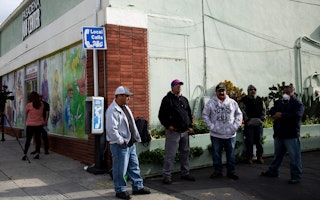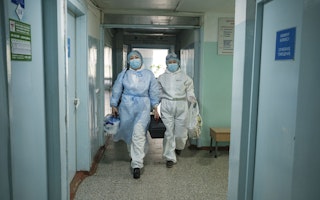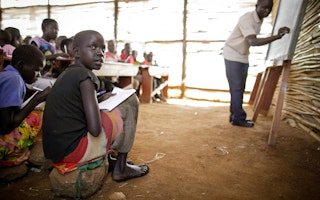
Migrant workers, including undocumented immigrants, play an essential role in the global economy. They work in critical sectors like agriculture, domestic work, and the service industries, in the United States, Europe, and beyond. Despite the pivotal role they play, millions of immigrant workers and families have been left largely to fend for themselves throughout the COVID pandemic, because they have not been included in government assistance.
How many people are we talking about?
In the United States, there are an estimated 8 million undocumented workers, accounting for over four percent of the total workforce. In New York City alone, there are estimated to be 646,000 undocumented workers. One in six undocumented workers lost their job in New York City as a result of the pandemic. In California, undocumented workers make up roughly a tenth of the state’s total workforce. In Europe, there are an estimated 4 million undocumented migrants, two-thirds of them living in Germany, France, the UK, and Italy. In the Arab States, an estimated 23 million migrant workers make up an average 70 percent of the workforce in the Gulf states.
Is any government funding reaching undocumented workers?
Mostly, no. In the United States, the American Rescue Plan, which passed the House in late February 2021, took important steps to rectify some of the shortcomings of previous COVID relief packages. However, efforts to expand government support to undocumented workers and their families, in the United States and elsewhere, continue to face political opposition from some conservative and nationalist voices.
But:
The State of California, where the vast agricultural sector depends on casual, undocumented labor, contributed $75 million to a $125 million fund to provide $500 in support per adult through a scheme launched in early May 2020 with additional support from private philanthropies.
In April 2021, the state of New York, in a groundbreaking decision, announced a $2.1 billion dollar fund to support undocumented and other workers whose income had been impacted due to the COVID pandemic yet have been excluded from federal relief and unemployment insurance through the state.
Pre-COVID, how much did undocumented workers contribute to the local economy?
Globally, migrant workers sent an estimated $625 billion to family in their countries of origin, in 2017. In the United States, undocumented workers contribute $11.7 billion dollars [PDF] a year in state and local taxes.
If financial support is available, how can it be distributed?
Many undocumented workers live in fear of being detained and deported—but often have close ties with other members of their communities, and with social, labor, and religious groups. This means that trusted local community and advocacy groups can play a vital role in delivering emergency support during this pandemic, and can work with both local government and private philanthropic funders to ensure that funding reaches those in need.
In the United States, Open Society is working closely with the National Domestic Workers Alliance, to build out their Alia platform—originally designed to administer a self-funded benefits system for domestic workers who are often undocumented and mostly without bank accounts—so that it could assist a broader range of essential workers in the United States who are vulnerable to the economic fallout of the crises, including undocumented workers.
How can undocumented workers be protected from the risks of COVID-19?
Beyond the economic impact, undocumented workers and their families are particularly at risk. Many are involved in essential work that has never stopped, such as food supply and retailing—and live in dormitories or crowded apartments where there is a higher risk of contagion.
Migrant workers must be made eligible for paid time off and sick leave. They should not be forced to choose between going to work sick and losing their livelihoods when they are taken ill. Few of the undocumented workers who lost their jobs as a result of this pandemic had income to fall back on because of low wages, lack of severance and exclusion from unemployment insurance and other social safety nets because of their legal status.
Guarantees must be put in place to ensure that undocumented workers are not at risk of losing their jobs or being reported to the authorities if they present themselves at a hospital or health care facility for care, or if they speak up about the workplace health and safety concerns or labor rights violations. In most countries, primary health care is inaccessible to people with irregular migration status. This means, in many cases, limited or no access to a general practitioner, and no right to subsidized care except in the case of emergencies. As this crisis has demonstrated clearly, health care for one is health care for all.
The COVID-19 pandemic is a reminder, too, of the need for quality jobs with livable wages and benefits, including paid leave, universal health care, and an inclusive social safety net that reaches the most marginalized in our societies.
Shouldn’t this work be the responsibility of government?
Yes. For too long, government has exploited the role of low-cost undocumented labor, without taking steps to regularize the status of millions of workers—a workforce that is painfully exposed even in the best of times. Private funders and civil society groups are now the main source of emergency support for many of these workers during the pandemic.
Some governments have responded with recognition of the role that these workers play. For example, in May 2020, Italy has said it would give temporary work permits to more than half a million undocumented migrants deemed essential to picking crops and caring for the elderly as part of a €50 billion stimulus package. The package also requires local government to take steps to improve unsanitary living conditions. Mexico City expanded its unemployment insurance program to include informal workers, many who are migrants working as domestic workers in private households.
What is Open Society doing?
At the outset of the Covid pandemic, the Open Society Foundations launched the Emma Lazarus Campaign, which committed $32 million dollars to cities, states and counties across the United States to support undocumented workers who had been left out of federal relief. We also provided $2 million to the Coronavirus Care Fund of the National Domestic Workers Alliance, and $2.8 million to support the development of the National Domestic Workers Alliance’s Alia platform. OSF also collaborated with others in philanthropy to establish the Families and Workers Fund, which supported numerous other worker and community-led direct relief funds in sectors such as agriculture and hospitality, as well as to Native American communities, LGBTI populations and gig workers hard hit by the economic crises.
In addition to this emergency support, we continue to provide support for community, labor, and policy advocacy groups that advocate for holistic responses to challenges faced by workers and immigrants writ large and to ensure an inclusive economic recovery, including the specific issues faced by undocumented workers and their families. Open Society continues to support local workers’ rights organizations across the Arab region and in Asia, Central America, and Mexico, to advocate for safe, decent, and healthy work environments for migrant workers.
Read more
A Nation of Immigrants
What the U.S. Still Owes Undocumented Workers

In the United States today, “essential” workers are more likely to be immigrants, and many of them are undocumented. Given all that these people have risked to keep society afloat, they deserve far more support.
A Holistic Answer
Demanding a Just COVID-19 Response

As our grantees, partners, and allies work tirelessly to reduce the damage brought on by the pandemic, we at Open Society are committed to long-term reforms that will address the structural injustices worsened by the virus.
Power for Refugees
Q&A: Empowered Refugees Lead the Way

The best way to support and empower refugees in a time of crisis is to recognize that they know best how to address the needs of their communities.